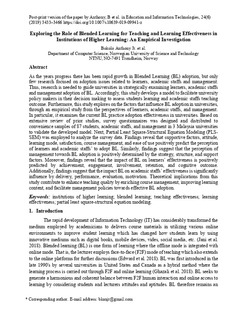| dc.description.abstract | As the years progress there has been rapid growth in Blended Learning (BL) adoption, but only few research focused on adoption issues related to learners, academic staffs and management. Thus, research is needed to guide universities in strategically examining learners, academic staffs and management adoption of BL. Accordingly, this study develops a model to facilitate university policy makers in their decision making to assess students learning and academic staffs teaching outcome. Furthermore, this study explores on the factors that influence BL adoption in universities, through an empirical study from the perspectives of learners, academic staffs, and management. In particular, it examines the current BL practice adoption effectiveness in universities. Based on extensive review of prior studies, survey questionnaires was designed and distributed to convenience samples of 87 students, academic staffs, and management in 3 Malaysia universities to validate the developed model. Next, Partial Least Square-Structural Equation Modeling (PLS-SEM) was employed to analyze the survey data. Findings reveal that supportive factors, attitude, learning mode, satisfaction, course management, and ease of use positively predict the perception of learners and academic staffs’ to adopt BL. Similarly, findings suggest that the perception of management towards BL adoption is positively determined by the strategy, structure, and support factors. Moreover, findings reveal that the impact of BL on learners’ effectiveness is positively predicted by achievement, engagement, involvement, retention, and cognitive outcome. Additionally, findings suggest that the impact BL on academic staffs’ effectiveness is significantly influence by delivery, performance, evaluation, motivation. Theoretical implications from this study contribute to enhance teaching quality by enriching course management, improving learning content, and facilitate management policies towards effective BL adoption. | nb_NO |
